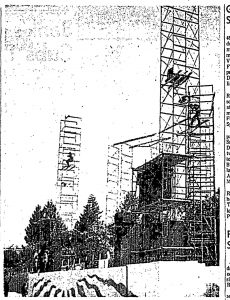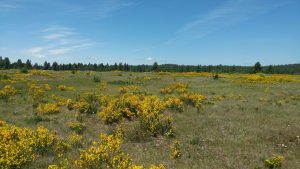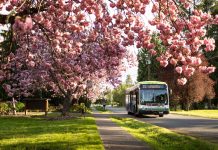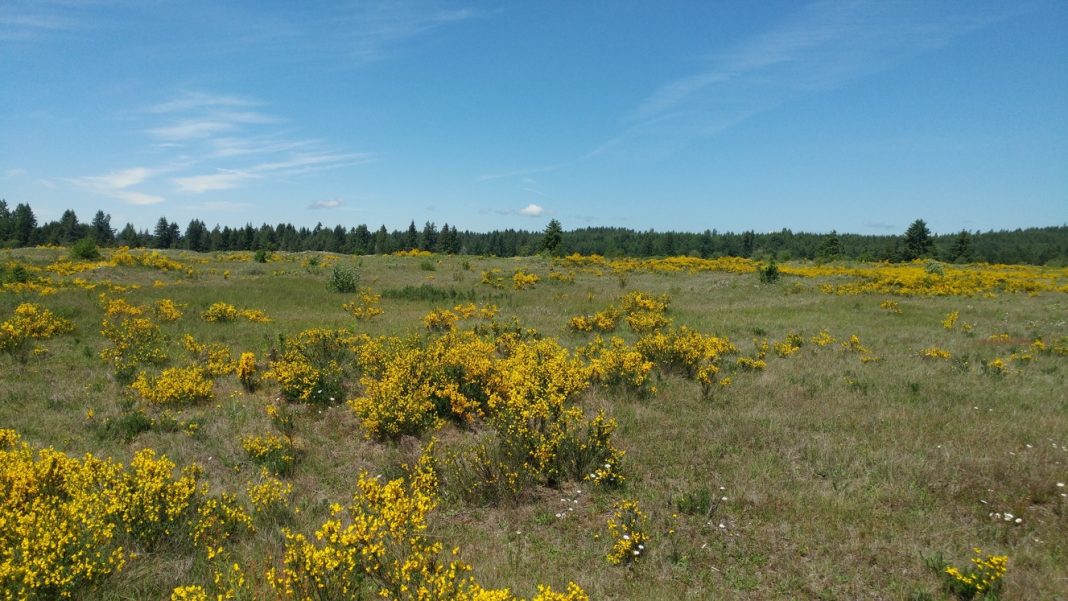To say that the 1960s were a time of culture clash is a stereotypical historical understatement. Even in this corner of the United States, peace marches, treaty rights protests, and counter culture ran hard against the grain of mainstream life. And music played a pivotal role.
 The phenomenon of the multi-day music concert (of a sort) had its birth in the Pacific Northwest, and one of the most impactful festivals of its kind happened 50 years ago this summer just north of Tenino.
The phenomenon of the multi-day music concert (of a sort) had its birth in the Pacific Northwest, and one of the most impactful festivals of its kind happened 50 years ago this summer just north of Tenino.
Sky River I in 1968 set the pace for Woodstock-like rock concerts. It was officially known as the Sky River Rock Festival and Lighter Than Air Fair. And, before the end of the summer of 1968, thousands of ticketed an unticketed rock fans descended on the small town of Sultan, Washington, along the Skykomish River.
While outdoor music events have obviously been held for longer than any of us know, the rise of multi-day rock concerts most likely began in the late 1960s with the Tripps Festival and the Fantasy Fair and Magic Mountain Music Festival in California. These shows brought headlines and they emphasized the culture clash between the drug and peace movements and mainstream culture in the 1960s.
But the main difference between the first Sky River concert and the ones before it was that Sky River I brought thousands of people to an undeveloped site (not an outdoor amphitheater for example). This undeveloped setting set the model for Woodstock a year later.

And while the world’s attention was turned to the iconic, multi-day, and out-of-control Woodstock, the second Sky River Festival and Lighter Than Air Fair began planning an event at a former cattle ranch between Olympia and Tenino.
The Rainier Hereford Ranch was located on both sides of the Burlington Northern Railroad and included the so-called “Mima Mounds,” though they are located several miles away from the state-preserved Mima Mounds near Little Rock.
According to the promoters, Sky River II was meant to “combat racism, hatred, violence, and poverty.” We’ll see that the local community didn’t seem to think this kind of tolerance could be tolerated, but the initial reaction by local leaders including the governor, county commissioners, law enforcement, and health officials was essentially: follow the rules and you’re good.
The original location for the second Sky River was supposed to be near Enumclaw, but that property owner pulled out when his neighbors complained about the possible impacts on their community.
That left the Hereford Ranch near Tenino. This 360-acre parcel just north of town had fallen out of local ownership a few years before. In 1968, it was owned by a Mercer Island family. While the initial reaction from local leaders in 1968 was essentially what Gov. Dan Evans said, “We can’t ban a rock concert, per se,” that didn’t mean the Hereford Ranch’s neighbors wouldn’t protest.

It wasn’t until a day after the Woodstock festival started in New York that the Sky River II festival began to make the papers. By time the legendary festival had closed and its full impact was known, Tenino-area residents were meeting in public to oppose Sky River II.
The Stop the Rock Festival Committee met on August 21 and was led by a local leader of the John Birch Society. Their protest wasn’t just that the festival goers would be bad neighbors, but that they would be the wrong kind of neighbors. County government and the organizers could find a way to fit 30,000 people into county rules about health and safety, but it would be harder to find room for the organizers of the festival who supported groups like the Black Panthers and Eldridge Cleaver. Tenino area residents weren’t able to welcome in agents of “glorification of communist movements in foreign countries.”
Landowners and the Tenino Chamber of Commerce quickly filed suit, claiming that there was no way the festival could be peaceful or not violate county rules. Specifically, the suite called out the impact of noise on cows (“…it would cause them to lose flesh. They won’t be grazing.”) After a local court agreed to stop the show, the State Supreme Court quickly stepped in to allow it go on, just a day before the festival was to open.
With a $25,000 bond paid to the county, a brand new stage, cyclone fencing around the site, vending and ticket selling booths, the Sky River II festival was ready to get underway on the Saturday of Labor Day weekend in 1969.
Things started slowly with only about 5,000 people coming in on Friday morning, but the crowd peaked at nearly 30,000 by Sunday.

Nudity, long hair, and drug use obviously dominated the scene. While the Thurston County Sheriff and private security officers were keeping the peace, there were very few arrests at the festival. Mostly, said the sheriff, as long as things were peaceful, they didn’t have the manpower to arrest every high person they saw.
Over 30 bands played over the three days, including Buddy Guy, Steve Miller, and Woodstock veterans Country Joe and the Fish.
The conditions were fairly typical for the end of a Pacific Northwest summer, which made it less than ideal. “It was hot and dry,” said George Barner, who attended the festival and would later become a Thurston County commissioner himself. “People were sitting around under whatever shade they could find.”
In the end, only two bad drug trips were reported at Sky River II. The biggest threat to public health was more mundane – the heat and the beer. Almost 400 people were treated at the medical tent for heat exhaustion and another 150 for cuts from beer bottles.
And for Tenino itself? “There were a couple of minor squabbles involving some motorcycle types, but nothing serious,” one officer noted in the Seattle Times. Even though some hippies came through town on foot, Tenino residents did nothing more than sneer at them and watch them walk by.
Fire was the biggest fear, given the festival happened at the driest part of the year in hot weather on an open prairie. But again, the only fire reported at the ranch happened days after the festival closed.



















































